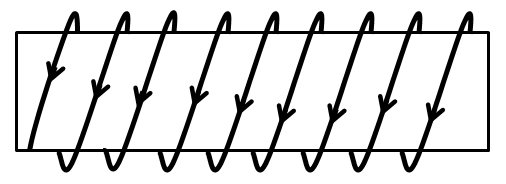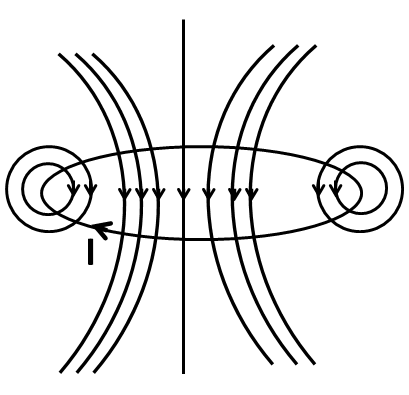
The magnetic field inside a long straight solenoid carrying current
A. Zero
B. Is the same at all points
C. Decreases as we move towards its end
D. Increases as we move towards its end
Answer
560.7k+ views
Hint: To answer this question, we need to draw the magnetic field lines for a solenoid of infinite length. The strength of the magnetic field at a point is proportional to the density of the magnetic field lines at that point. So we have to observe the density of the magnetic field lines for different points within the long solenoid.
Complete answer:
Let us consider a part of an infinitely long solenoid as shown in the below figure.

Let a current of $I$ flows through the solenoid. We can see that there are a number of closely spaced coils wound around the solenoid. The magnetic field inside the solenoid will be due to the current flowing in each of the individual coils. The magnetic field lines for a circular coil is shown in the below diagram.

We see that the magnetic field lines form closed loops around the coil. But since an infinitely long solenoid will consist of infinite such coils, so the magnetic field lines will not be able to bend to form closed loops within the solenoid. So they will just be straight and parallel lines, as shown below.

As we can clearly see that the magnetic field lines are equally dense within the solenoid. Since the strength of the magnetic field at a point is proportional to the density of the magnetic field lines at that point, so the magnetic field will be uniform inside the long solenoid.
Hence, the correct answer is option B.
Note: We could also answer this question by using the formula for the magnetic field inside a long solenoid which is given as $B = {\mu _0}nI$. As evident from this formula, the magnetic field does not depend on the position, so the magnetic field must be uniform within the solenoid.
Complete answer:
Let us consider a part of an infinitely long solenoid as shown in the below figure.

Let a current of $I$ flows through the solenoid. We can see that there are a number of closely spaced coils wound around the solenoid. The magnetic field inside the solenoid will be due to the current flowing in each of the individual coils. The magnetic field lines for a circular coil is shown in the below diagram.

We see that the magnetic field lines form closed loops around the coil. But since an infinitely long solenoid will consist of infinite such coils, so the magnetic field lines will not be able to bend to form closed loops within the solenoid. So they will just be straight and parallel lines, as shown below.

As we can clearly see that the magnetic field lines are equally dense within the solenoid. Since the strength of the magnetic field at a point is proportional to the density of the magnetic field lines at that point, so the magnetic field will be uniform inside the long solenoid.
Hence, the correct answer is option B.
Note: We could also answer this question by using the formula for the magnetic field inside a long solenoid which is given as $B = {\mu _0}nI$. As evident from this formula, the magnetic field does not depend on the position, so the magnetic field must be uniform within the solenoid.
Recently Updated Pages
Master Class 12 Economics: Engaging Questions & Answers for Success

Master Class 12 Physics: Engaging Questions & Answers for Success

Master Class 12 English: Engaging Questions & Answers for Success

Master Class 12 Social Science: Engaging Questions & Answers for Success

Master Class 12 Maths: Engaging Questions & Answers for Success

Master Class 12 Business Studies: Engaging Questions & Answers for Success

Trending doubts
Which are the Top 10 Largest Countries of the World?

What are the major means of transport Explain each class 12 social science CBSE

Draw a labelled sketch of the human eye class 12 physics CBSE

Why cannot DNA pass through cell membranes class 12 biology CBSE

Differentiate between insitu conservation and exsitu class 12 biology CBSE

Draw a neat and well labeled diagram of TS of ovary class 12 biology CBSE




